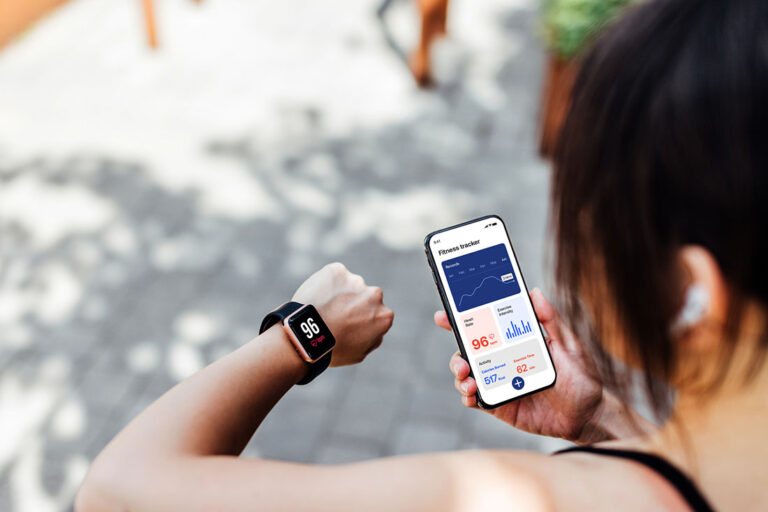Posted by: Lisette Hilton April 3, 2024 | 7 minutes read |
share

Article summary
- Sylvester Comprehensive Cancer Center will present its use of digital technology at the upcoming eMerge Americas conference.
- Sylvester's My Wellness Research platform rapidly synthesizes large amounts of data to assess the impact of nutrition and dietary changes in cancer treatment.
- The data supports Sylvester's approach to lifestyle medicine by accurately assessing patient and research participant behavior.
Advances in technology are revolutionizing our ability to investigate the effects of diet and exercise on cancer prevention, treatment, and survival.
Sylvester Comprehensive Cancer Center, part of the University of Miami Miller School of Medicine, will present its pioneering approach at the eMerge Americas conference April 18-19 in Miami Beach.
Learn more and register for eMerge Americas
This year, Sylvester is establishing a powerful cancer lifestyle medicine resource with its unique research platform, My Wellness Research, under the ambitious Sylvester Cancer Data Ecosystem Initiative. This comprehensive digital repository integrates patient-generated lifestyle data with genomic, imaging, clinical notes, and sociodemographic factors from electronic medical records.
Lifestyle research on the rise
“For the first time, we can see the direct, real-time effects of cancer treatment and diet and exercise interventions,” said Tracy E. Crane, Ph.D., RDN, co-leader of the Cancer Control Program. . Director of Lifestyle Medicine, Prevention, and Digital Health at Sylvester Comprehensive Cancer Center. “The My Wellness Research platform allows us to monitor individual patients and populations, detect trends, and quickly address them using automated tools and human support as needed. ”

My Wellness Research collects patient data from interactive voice responses, web-based calls, video exercise and nutrition sessions, and wearable devices. The system facilitates communication between patients, study participants, and health coaches, and reports patient health and lifestyle information to healthcare providers.
As elements of cancer treatment move from the doctor's office to the home, digital tools like My Wellness Research allow researchers and oncologists to monitor patients while providing remote care.
“The data collected from these wearables and remote assessments can be used to develop more precise treatment plans and interventions tailored to each individual patient, generated by the patient's own data,” Miller Hospital said. said Dr. Gilberto López, Chief of Medical Oncology at . School and Associate Director of Global Oncology at Sylvester University.

Gray Freilersise, senior manager at Sylvester University's Crane Institute, says lifestyle data is typically undervalued in the field of computational oncology, but it has an impact on patients' quality of life and health outcomes. .
Human behavior as big data
Technology provides researchers with the tools to answer important questions at scale.
“Previously, we surveyed study participants about their daily dietary intake and physical activity, but this type of data collection was cumbersome and limited our ability to study large numbers of people,” Dr. Crane said. said. “Now that we have access to wearables and other technologies, we are beginning to understand the questions that need to be answered by applying lifestyle medicine directly to the daily lives of cancer patients.”
“Humans are more than just a genome,” Freilersise says. “Lifestyle medicine allows us to intelligently add pieces of human behavior to the data we collect from people. We can do that from wearable devices like Fitbit or Apple Watch, or by incorporating Veggie Meters. There is a possibility that the®This is a non-invasive way to record someone's dietary pattern in terms of vegetable and fruit intake, without having to remember or record intake or provide a blood sample. ”

Technology also allows for the interpretation of large-scale data. Sylvester researchers look for audio patterns in recorded conversations between patients and health coaches. In the Lifestyle Interventions to Improve Survival of Ovarian Cancer (LIVES) study, natural language processing and machine learning enabled the analysis of her 17,000 hours of health coaching calls with ovarian cancer survivors.
“It's impossible for a human being to accomplish that without dedicating their entire career to this work,” Freilersise said.
Rapid analysis allows the team to create models based on language and emotion to predict changes in diet and exercise in study participants.
computational oncology
Sylvester's complex digital work requires seamless data integration with the Sylvester Data Portal. According to Sylvester's Assistant Director of Science, Dr. Vasilios Statias, this portal ensures “FAIR” (searchable, accessible, interoperable and reusable) data.
“The Sylvester Data Portal was created to collect, aggregate, standardize, and analyze all the different types of data that cancer centers generate,” said Dr. Stathias.

According to Dr. Stasias, Sylvester uses portal data to create robust images of patients.
“In my opinion, the only way to provide truly precision treatment is to utilize digital technology to inform human thinking rather than replace it,” Dr. Crane said. said. “We and other research teams around the world believe this will lead to improved overall patient experience and outcomes.”
tag: Cancer and Exercise, Dr. Gilberto Lopez, Dr. Tracy Crane, Nutrition, Technology


